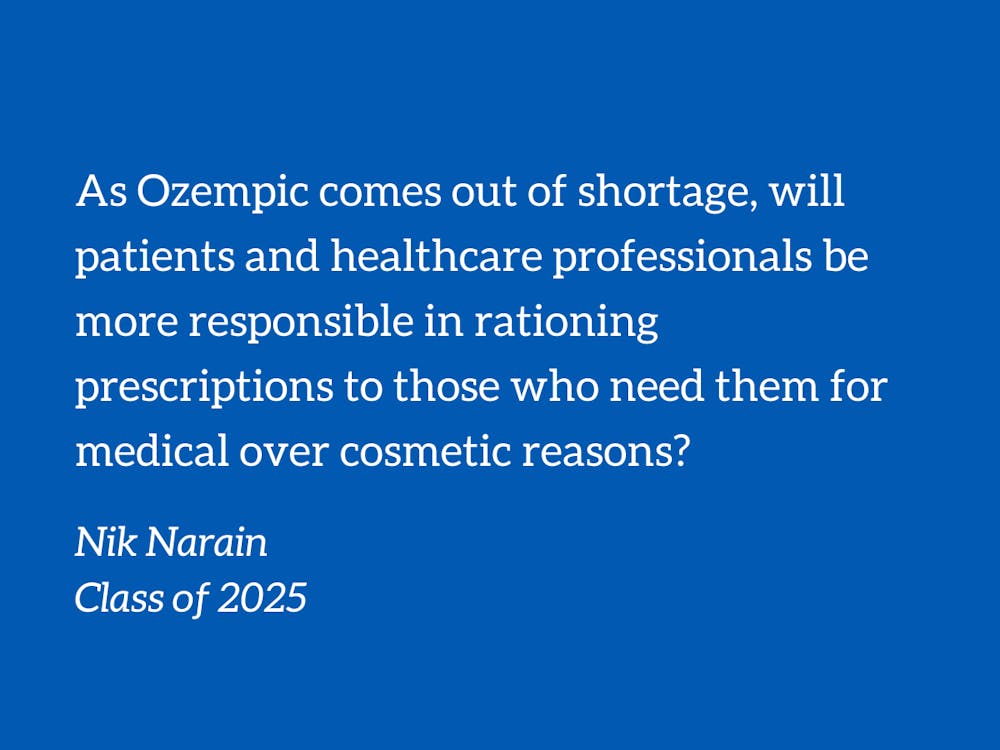I remember seeing an Ozempic commercial for the first time a year ago, the familiar tune of the Pilot song “It’s Magic” playing on loop, only the words “it’s magic” were conveniently replaced with “Ozempic.” You know.
Ozempic, as explained on the drug’s website, is a once-weekly injection to lower A1C, a measure of average blood sugar. It has been proven to reduce the risk of major cardiovascular events such as heart attack or stroke in adults with type 2 diabetes and other heart diseases. Most notably, Ozempic may aid in weight loss, with some of its users losing up to 14 pounds or more.
Ozempic is a semaglutide medication patented by the Danish pharmaceutical company Novo Nordisk. Semaglutide works by mimicking the naturally-occurring hormone glucagon-like peptide 1 (GLP-1), which stimulates the secretion of insulin and inhibits the secretion of glucagon. This is extremely helpful for individuals with type II diabetes, where their bodies don’t produce enough or respond well enough to insulin and overproduce glucagon. Glucagon increases blood sugar levels, while insulin decreases it, and the decrease in insulin further corresponds to a decrease in appetite.
Ozempic is explicitly advertised as not a weight-loss drug and its use is highly discouraged among non-diabetics. Yet, the weight-loss side effect has nevertheless captured the attention of celebrities, TikTok influencers, and thousands of Americans looking to slim down. Big names like Chelsea Handler, the Kardashians, and even Elon Musk have all admitted to using Ozempic or its cousin drug Wegovy, making these drugs what NPR called a “blockbuster diet drug” and “the worst kept secret in Hollywood.” And on TikTok, #Ozempic has garnered over 600 million views and counting.
In our fatphobic culture riddled with rhetoric of the dangers of obesity, the prospect of a magic weight loss injection is undeniably alluring. Despite efforts to push against weight stigma since the 1960s, the desire to achieve thinness by any means necessary remains what New Yorker writer Jia Tolentino calls an “almost foundational tenet of female socialization.” In fact, a Harvard study, drawing on data from the Implicit Association Test, which asks people to sort words and images into “good” and “bad” categories, found that implicit weight bias actually grew by 40% between 2004 and 2010, while explicit weight bias as well as all other implicit biases (i.e. regarding race, gender, sexual orientation, etc.) waned or remained stable.
The supposed “immorality” and “repugnance” of larger body size has made everyone so terrified of appetite that we will try to suppress it at any cost. And it is a significant cost - as most health insurance companies don’t cover drugs like Ozempic or Wegovy, a monthly prescription costs over $1000, which people simply can’t afford, especially the groups who are affected by obesity and type 2 diabetes the most.
Ozempic prescriptions in the US reached an all-time high in the last week of February 2023, with over 373,000 prescriptions filled, according to a J.P. Morgan analysis of IQVIA data shared with CNN. Of these, more than half were new prescriptions. The director of NYU Langone Health’s Weight Management Program, Holly Lofton, reported writing over 1400 prescriptions for semaglutide in the past six months. Because of Ozempic’s popularity, the prescription weight-loss drug market is expected to reach $1.9 billion this year. That’s a lot of money going into drastically shrinking bodies that, at least in the medical sense, don’t need it, and often become worse off from the side effects. Doctors have reported patients getting nausea, diarrhea, and constipation so severe they have to go to the E.R., not to mention rare but notable risks for pancreatitis and thyroid cancer. And the long-term impacts of this “miracle diet drug” have not yet been studied.
To be clear, for those who need it, Ozempic can be extremely beneficial. People who have struggled with appetite and blood sugar for years report a regained sense of control and peace in their bodies. And in all fairness, in the U.S., medicines approved for specific uses can be legally approved off-label for any use, so there’s no legal issue regarding non-diabetics accessing Ozempic. While popularizing the euphoria that comes with not wanting to or forgetting to eat has received significant backlash from the ED care communities, if spending $1000 on a “magic injection” improves one’s quality of life, regardless of their preexisting condition, who am I to judge?
Since August 2022, Ozempic was in mass shortage, causing many to cease, ration, or purchase the drug via online black markets. As Ozempic is intended to be a long-term weight-loss solution, any weight lost on Ozempic will naturally come back when you stop the injections. But as Ozempic comes out of shortage, will patients and healthcare professionals be more responsible in rationing prescriptions to those who need them for medical over cosmetic reasons? Will celebrities and your one rich aunt continue to depend on a potentially dangerous drug just to be able to look at themselves on Instagram? And will Ozempic change the notion that we can accept our bodies just as they are, and that maybe shrinking ourselves is not the best solution to growing our self-confidence?
At the end of the day, Ozempic is a “quick fix” for much larger health issues in America. Mass-prescribing an expensive drug is not only a highly unsustainable solution for heart health, but it negates the importance of prevention-based measures like tackling food insecurity and renovating public parks. And if we truly want to reduce the risks for high blood sugar and diabetes, clinicians have to start with dismantling weight bias and creating an equitable environment where body size isn’t a barrier to access care.
Nik Narain is a Trinity sophomore. His columns typically run on alternate Fridays.
Get The Chronicle straight to your inbox
Sign up for our weekly newsletter. Cancel at any time.

